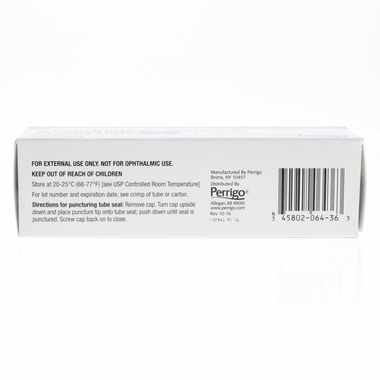SAVE 17% OFF 17% OFF Use Code LUCKY17 *
Triamcinolone for Dogs & Cats - Acetonide Cream USP - 0.1% (15 gm) - [Skin Irritation]
- Description
- Directions
- FAQ
- Reviews
Description
Triamcinolone Acetonide Cream USP is a topical corticosteroid medication used to treat various skin conditions in dogs and cats. This cream contains the active ingredient triamcinolone acetonide, which helps reduce inflammation, itching, and redness associated with dermatitis, eczema, allergic reactions, and other skin conditions. Triamcinolone Acetonide Cream is available in different strengths, including 0.1% and 0.5%, and is applied directly to the affected area of the skin. It is a prescription medication and should be used as directed by a veterinarian. Triamcinolone Cream, Triamcinolone Acetonide Cream, Triamcinolone Cream for Dogs, Triamcinolone Cream for Cats, Corticosteroid Cream, Skin Conditions, Inflammation, Itching, Redness, Topical Application.
Key Benefits:
- Anti-Inflammatory: Triamcinolone Cream 0.1% effectively reduces inflammation, providing relief from itching and discomfort associated with skin conditions.
- Itch Relief: By reducing itching and inflammation, this cream helps to alleviate the urge to scratch, which can further irritate the skin.
- Skin Healing: Triamcinolone Cream 0.1% can help promote the healing of the skin, especially in cases where inflammation is hindering the natural healing process.
- Convenient Application: The cream is easy to apply and can be used on various parts of the body, making it convenient for treating localized skin conditions.
How It Works
Triamcinolone Acetonide Cream USP works by reducing inflammation and suppressing the immune response in the skin. The active ingredient, triamcinolone acetonide, is a corticosteroid that acts as an anti-inflammatory agent. It works by inhibiting the production of inflammatory chemicals in the skin, such as prostaglandins and leukotrienes, which are involved in the inflammatory process. By reducing inflammation, Triamcinolone Acetonide Cream helps alleviate itching, redness, and swelling associated with various skin conditions in dogs and cats.
Indications
Triamcinolone Acetonide Cream USP is indicated for the relief of inflammatory and pruritic manifestations of corticosteroid-responsive dermatoses in dogs and cats. This includes conditions such as allergic dermatitis, eczematous dermatitis, and other inflammatory skin conditions where a corticosteroid would be beneficial in reducing inflammation and itching. Triamcinolone Acetonide Cream should be used as directed by a veterinarian for the specific condition being treated.
Specifications:
- Brand: Triamcinolone Acetonide Cream
- Generic Name: Triamcinolone Acetonide
- Type: Topical cream
- Indicated for: Treatment of skin irritation, itching, and inflammation in dogs and cats
- Dosage Form: Cream
- Strength: 0.1%
- Administration: Apply a thin layer to the affected area(s) of the skin
- Packaging: Available in tubes of various sizes
- Storage: Store at room temperature, away from moisture and heat
- Manufacturer: Various generic manufacturers
- Prescription Required: Yes, prescription-only medication. Must be prescribed by a veterinarian.
Directions
Topical corticosteroids are generally applied to the affected area as a thin film from two to four times daily depending on the severity of the condition.
Occlusive dressing may be used for the management of psoriasis or recalcitrant conditions. If an infection develops, the use of occlusive dressing should be discontinued andappropriate antimicrobial therapy instituted.
- Wear gloves for application if required by universal precautions.
- Apply a thin film and rub gently into the cleansed, slightly moist affected area.
- The treated skin area should not be bandaged or otherwise covered or wrapped as to be occlusive unless directed by the prescriber. Occlusive dressings may be necessary for psoriasis or severe or recalcitrant conditions.
- Wash hands before and after use.
Cautions
Keep out of the reach of children. Do not use in pets with known allergies to triamcinolone. Triamcinolone is not for use in the treatment of viral and fungal infections. Let your veterinarian know if your pet suffers from kidney disease, liver disease, heart disease, or hypothyroidism. Triamcinolone will weaken your pet's immune system. Use with caution in animals suffering from glaucoma, diabetes mellitus, Cushing's syndrome, pregnancy, heart failure, corneal ulcers, or high blood pressure. Store at room temperature. Store protected from light and moisture.
Side Effects:
If any of the following serious side effects occur, stop giving triamcinolone and seek emergency veterinary medical attention: an allergic reaction (difficulty breathing; swelling of the lips, tongue or face; hives), increased blood pressure or sudden weight gain. Other less serious side effects may occur. Continue giving triamcinolone and talk to your veterinarian if your pet experiences insomnia, nausea, vomiting or stomach upset, fatigue, muscle weakness or joint pain, problems with diabetes control, or increased hunger or thirst. Other side effects that rarely occur, usually with high doses of triamcinolone include thinning of the skin, cataracts, glaucoma, and behavior changes. Other side effects may also occur. Talk to your veterinarian about any side effect that seems unusual or bothersome to your pet.
Storage:
Should be stored at room temperature, away from moisture and heat.
Drug & Food Interactions
Notify your veterinarian of any other medications, including vitamins and supplements, your pet is taking before using this medication.
Adverse Reactions
The following local adverse reactions are reported infrequently with topical corticosteroids, but may occur more frequently with the use of occlusive dressings. These reactionsare listed in an approximate decreasing order of occurrence: burning, itching, irritation, dryness, folliculitis, hypertrichosis, acneiform eruptions, hypopigmentation, perioraldermatitis, allergic contact dermatitis, maceration of the skin, secondary infection, skin atrophy, striae and miliaria.
Contraindications
Topical corticosteroids are contraindicated in those patients with a history of hypersensitivity to any of the components of the preparations.













